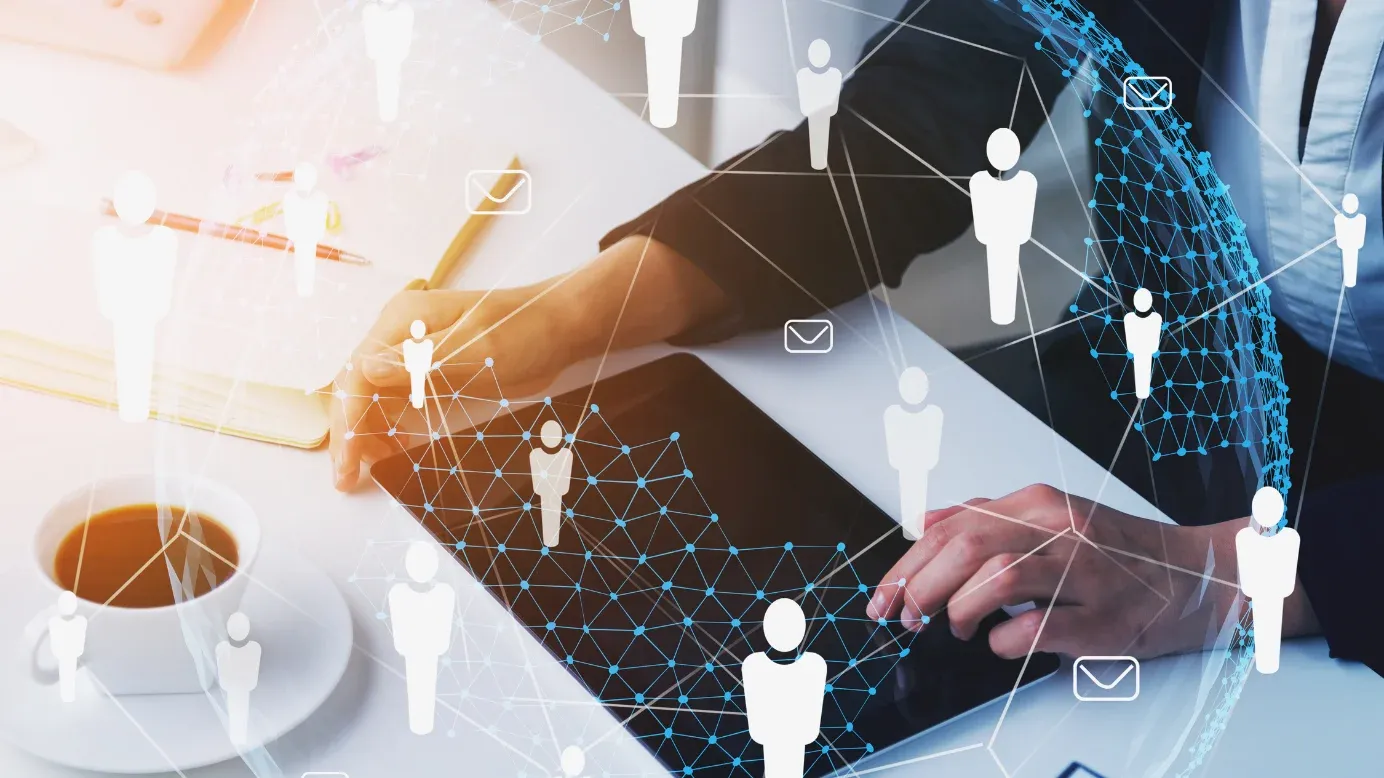8 Top HR Trends That Will Shape the Future of Work in 2025
Discover the most impactful HR trends for 2025 that are redefining workplace strategies—from AI and skills-first hiring to holistic engagement and financial wellness.
On this page
“The only thing worse than being blind is having sight but no vision.” — Helen Keller
As we step into a new year, this quote resonates deeply with the HR practices implemented at any workplace. Today, HRs are more like a tech-savvy trendsetter, always ready for the next big thing. They will have to continue to adapt to technological advancements, societal shifts, and changing employee expectations.
The reason is clear: The shift is big. It's no longer only about managing people but to drive how we all work.
At the forefront of this transformation, a few key HR trends are poised to redefine the way organizations approach people management.
Let’s understand how.
7 HR trends that will redefine workplace practices
These HR trends highlight a significant shift towards a more holistic, employee-centered approach. When adopted, companies can not only enhance their workforce's productivity and well-being but also ensure sustained business success.
1. Holistic employee engagement platforms will take center stage
This proves that things are no longer about the occasional team lunch or the yearly performance review. Companies are realizing the need for a more comprehensive approach to keep their employees motivated, productive, and, most importantly, happy. Employee engagement is not just a buzzword; it's a key driver of business success.
Why there is a shift towards holistic employee engagement platforms:
- Diverse workforce needs: The traditional top-down approach to management is giving way to more inclusive and collaborative work cultures. Holistic platforms support this shift by facilitating open communication and employee involvement in decision-making.
- Technological advancements: The rise of digital tools and platforms allows for more innovative and effective ways to engage employees, from virtual team-building activities to AI-driven personalized feedback systems.
With the rise of digital tools, using a cloud-based HR system has become a smart move as the system makes it easier for everyone to stay connected and share ideas. It helps organize team activities and give feedback tailored to each person.
Moreover, cloud-based HR systems provide scalability and flexibility that traditional systems can't match. As organizations grow, their needs change, and a cloud-based system can adapt quickly to these changes without the need for significant infrastructure investments.
This adaptability is particularly beneficial in rapidly evolving industries or in times of organizational change, such as mergers or expansions. - Rising importance of well-being: There's a growing focus on mental health and overall well-being in the workplace, which holistic platforms effectively address.
- Changing employee expectations: Today's employees seek meaningful work and personal growth opportunities, going beyond just financial compensation.
- Business performance link: There's a clearer understanding of the direct impact of employee engagement on business performance, including productivity, innovation, and customer satisfaction.
Factors to look for when choosing a holistic employee engagement platform:
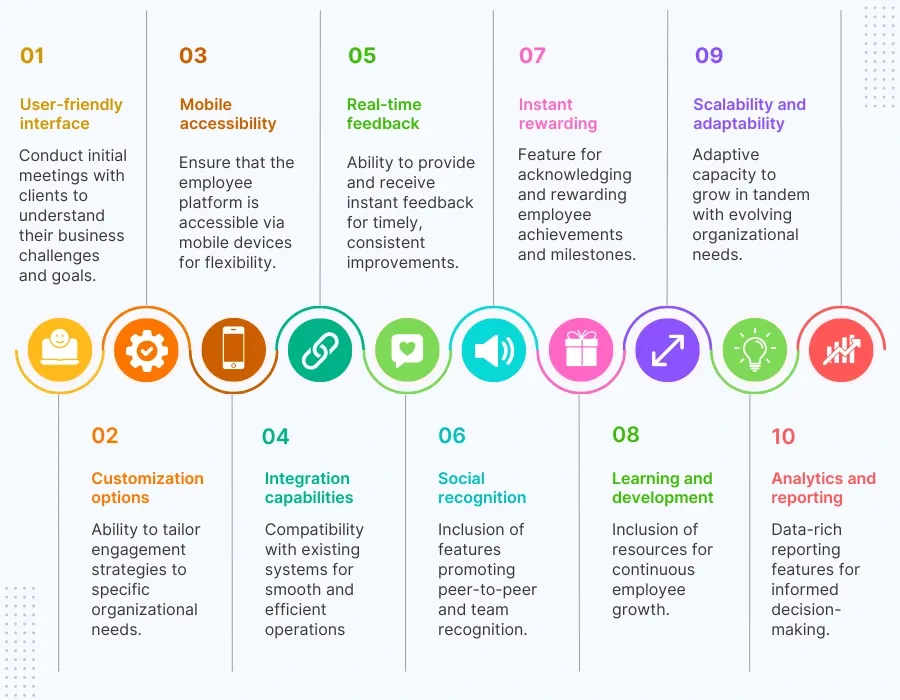
Salesforce, a global leader in CRM solutions, places a high priority on cultivating a healthy workforce. The company has implemented a unique wellness reimbursement initiative, providing employees with a monthly allowance of $100. This allowance can be utilized for various activities such as attending concerts, participating in gym classes, or seeking nutritional therapy.
The positive impact of these wellness programs on the overall welfare of employees has been significant, showcasing Salesforce's dedication to fostering a thriving and supportive work environment.
The impact of implementing holistic employee engagement platforms
2. Digital rewards and recognition features will be in high demand
As the shape of work evolves, so does the approach to employee rewards. Digital badges and rewards have taken center stage, offering a convenient yet impactful way to recognize achievements.
Why digital rewards and recognition are trending:
- Instant gratification: Digital rewards can be distributed instantly, providing immediate recognition and gratification, which can boost morale and motivation.
- Convenience and accessibility: Digital rewards are easily accessible to a diverse and often geographically dispersed workforce. Whether an employee is working remotely or in the office, digital recognition ensures everyone can be appreciated without logistical challenges.
- Gamification elements: Incorporating gamification elements into digital rewards adds an element of fun and engagement. By turning recognition into a game, employees are motivated to achieve more and contribute positively to the work environment.
- Global connectivity: In today's globalized workforce, digital rewards transcend borders. They allow companies to celebrate achievements on a global scale, fostering a sense of unity and shared success among employees across different regions.
- Environmental concerns: Digital rewards are more environmentally friendly compared to physical rewards, which aligns with the growing emphasis on sustainability in business practices too.
Factors to look for in people engagement platforms with digital rewards and recognition features:
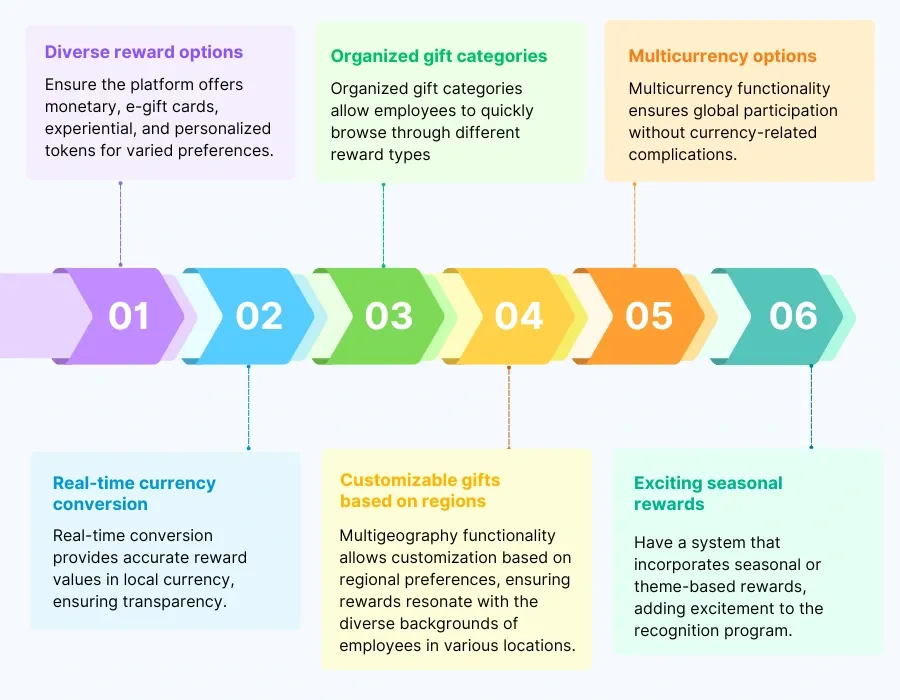
Rakuten firmly believes in keeping everyone involved. They foster a sense of connection within the company culture by offering corporate sports club memberships and gym access. Plus, they chip in with financial perks like helping out with relocation. It's their way of making work a place where everyone's happy and connected.
The impact of implementing digital rewards and recognition
3. The generative AI experience will transform employee experience
Generative AI, contrary to dystopian fears, has revolutionized HR tech platforms. It's not about replacing humans but enhancing the employee experience. AI helps in personalizing the employee journey, from onboarding to training, and even in performance management.
Why AI in HR is trending:
- Predictive insights: Generative AI analyzes patterns to predict future needs, ensuring proactive responses to employee requirements.
- Tailored learning paths: Say goodbye to one-size-fits-all training. AI crafts personalized learning experiences, addressing individual skill gaps and promoting continuous growth.
- Efficient task automation: No more drowning in repetitive tasks. AI takes care of the mundane, giving employees the freedom to focus on tasks that truly matter.
- Enhanced decision-making: Data-driven insights from AI empower HR professionals to make informed decisions, fostering a culture of continuous improvement.
- Boosts employee satisfaction: When work feels tailored, when tasks are streamlined, and when growth is personalized, employee satisfaction skyrockets.
Factors to look for when choosing a platform with generative AI
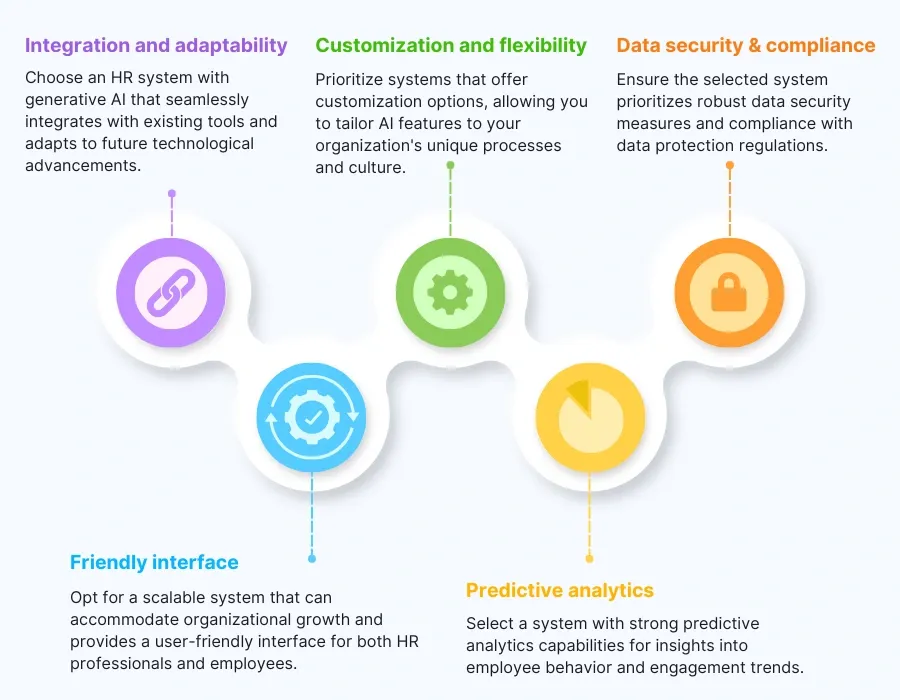
One shining example of a company at the forefront of implementing AI in their HR systems is IBM. IBM has seamlessly integrated AI into various aspects of their HR processes, from recruitment to employee engagement.
Through their AI-powered tools, IBM has enhanced the efficiency of their hiring processes, ensuring a more precise match between candidates and job roles. Moreover, their AI-driven HR systems provide personalized learning experiences for employees, contributing to continuous skill development and career growth.
IBM's adoption of AI in HR exemplifies how technology can be harnessed to create a more streamlined, personalized, and forward-thinking workplace experience.
The impact of implementing generative AI in HR systems
4. Skills-based hiring and internal talent mobility will shape workforce strategy
Organizations are increasingly moving beyond traditional credentials like degrees and job titles, instead focusing on what employees can do—their skills, adaptability, and growth potential. This marks a pivotal moment in HR transformation trends, pushing for more dynamic internal talent marketplaces and employee experience platforms that facilitate learning and growth.
Why there’s a shift toward skills-based talent strategies:
- Skill-first approach: Companies are filling roles faster and more accurately by evaluating technical and soft skills rather than educational backgrounds.
- Internal mobility: Employees prefer to grow within their current organization. Promoting from within fosters loyalty and reduces hiring costs.
- Faster reskilling cycles: New roles are emerging, and skills are becoming obsolete faster than ever—making agile learning paths a must.
IBM has long championed a skills-first hiring model, focusing on competencies over credentials. Through its internal mobility platform, employees are matched with career opportunities based on evolving skill profiles and aspirations.
The impact of implementing skills-based hiring and mobility
5. Financial wellness programs will become essential for engagement
As part of the latest HR trends and practices, financial wellness is emerging as a pillar of employee well-being and engagement. Modern employee experience platforms now bundle budgeting tools, investment education, and emergency savings plans into the broader benefits ecosystem.
Why financial wellness matters:
- Reduces workplace stress: Financially secure employees are more focused and engaged.
- Complements mental well-being: Money-related anxiety often overlaps with mental health issues.
- Improves retention: Employees are more likely to stay with organizations that support their long-term financial health.
PwC provides holistic financial planning support, including debt counseling and retirement savings sessions, promoting a more secure and satisfied workforce.
The impact of implementing financial wellness programs
6. Organizational culture and civility will drive retention and productivity
A thriving culture is no longer about perks—it's about how people feel, how they’re treated, and whether they can do their best work. In today’s work environment, human resources trends focus on building high-trust, inclusive environments where people feel safe, seen, and supported.
Why civility and culture are essential:
- Reduces conflict and burnout: Respectful workplaces lower emotional exhaustion and employee churn.
- Attracts top talent: Culture-first organizations are more appealing to Gen Z and Millennials.
- Boosts engagement: Employees in positive work environments perform better and stay longer.
Zappos infuses every aspect of its operations with cultural fit and kindness, with hiring processes that include team evaluations for interpersonal alignment—not just skill.
The impact of a strong culture and civility focus
7. AI-powered HR tech will fuel strategic decision-making
AI isn’t here to replace humans—it’s here to elevate the human experience in the workplace.
While you already covered generative AI, the 2025 evolution of AI-powered HR tech goes deeper. It now enables strategic forecasting, hyper-personalized learning, and predictive engagement modeling, making HR teams proactive rather than reactive.
How AI is advancing HR strategy:
- Predictive workforce planning: Anticipate attrition, engagement dips, and hiring needs before they become issues.
- AI-enabled onboarding: Personalized new hire journeys that cut ramp-up time in half.
- Dynamic talent insights: Get real-time views into team performance, burnout risk, and skill development.
Unilever has revamped its feedback system using AI analytics, helping managers identify blind spots, bias, and performance trends before annual reviews.
The impact of adopting AI-powered HR systems
8. Strategic workforce planning will become a core leadership priority
Strategic workforce planning is one of the top HR trends and predictions for 2025, particularly in navigating uncertainty and aligning talent with business goals.
Leaders are adopting agile planning models to ensure the right people are in the right roles at the right time—backed by data and aligned with company direction.
Why it matters now more than ever:
- Faster business model pivots: Remote, hybrid, and global workforces require real-time labor optimization.
- Leadership pipeline development: Succession planning ensures continuity in times of change.
- Alignment with future skills: Keeps the organization resilient and competitive.
Microsoft uses real-time labor data and business insights to map future skill needs and assess internal readiness, enabling swift reskilling and hiring decisions.
The impact of strategic workforce planning
How Empuls can help organizations lead these 2025 HR trends
As the workplace continues to evolve, Empuls stands out as a comprehensive employee engagement, rewards, recognition, and well-being platform designed to power the future of work. Here's how Empuls enables organizations to stay ahead by embracing the 2025 hr trends:
1. Empuls for holistic employee engagement platforms
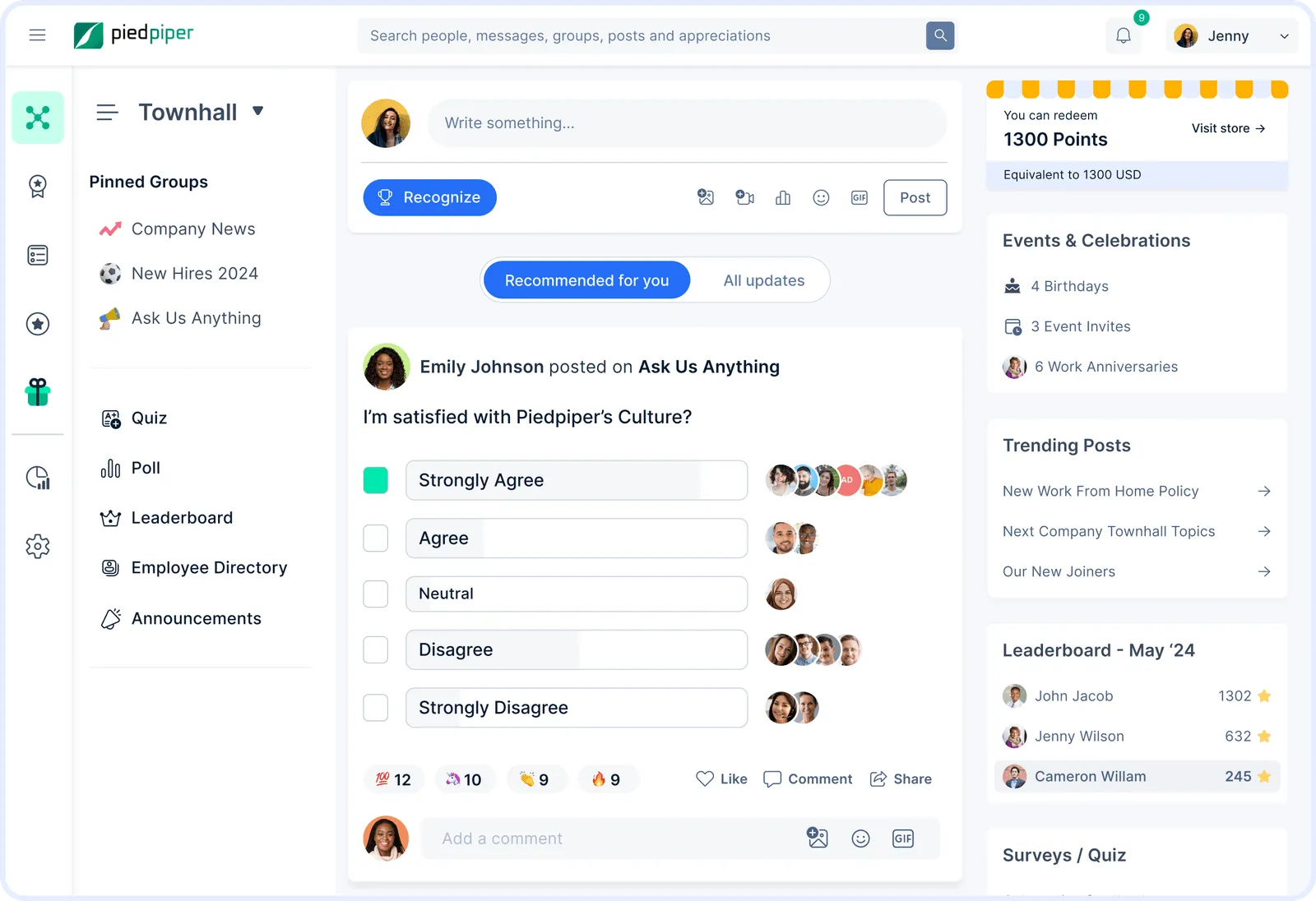
Empuls offers an all-in-one engagement platform that brings together employee communication, pulse surveys, social intranet, and continuous feedback under one roof.
It’s built to:
- Foster open, two-way communication.
- Enable collaborative decision-making.
- Promote well-being programs and employee resource groups.
- Facilitate tailored engagement for different demographics and needs.
- Provide real-time insights into employee morale and satisfaction.
Bonus: With customizable surveys and campaigns, HRs can keep a pulse on evolving employee needs proactively.
2. Empuls for digital rewards and recognition
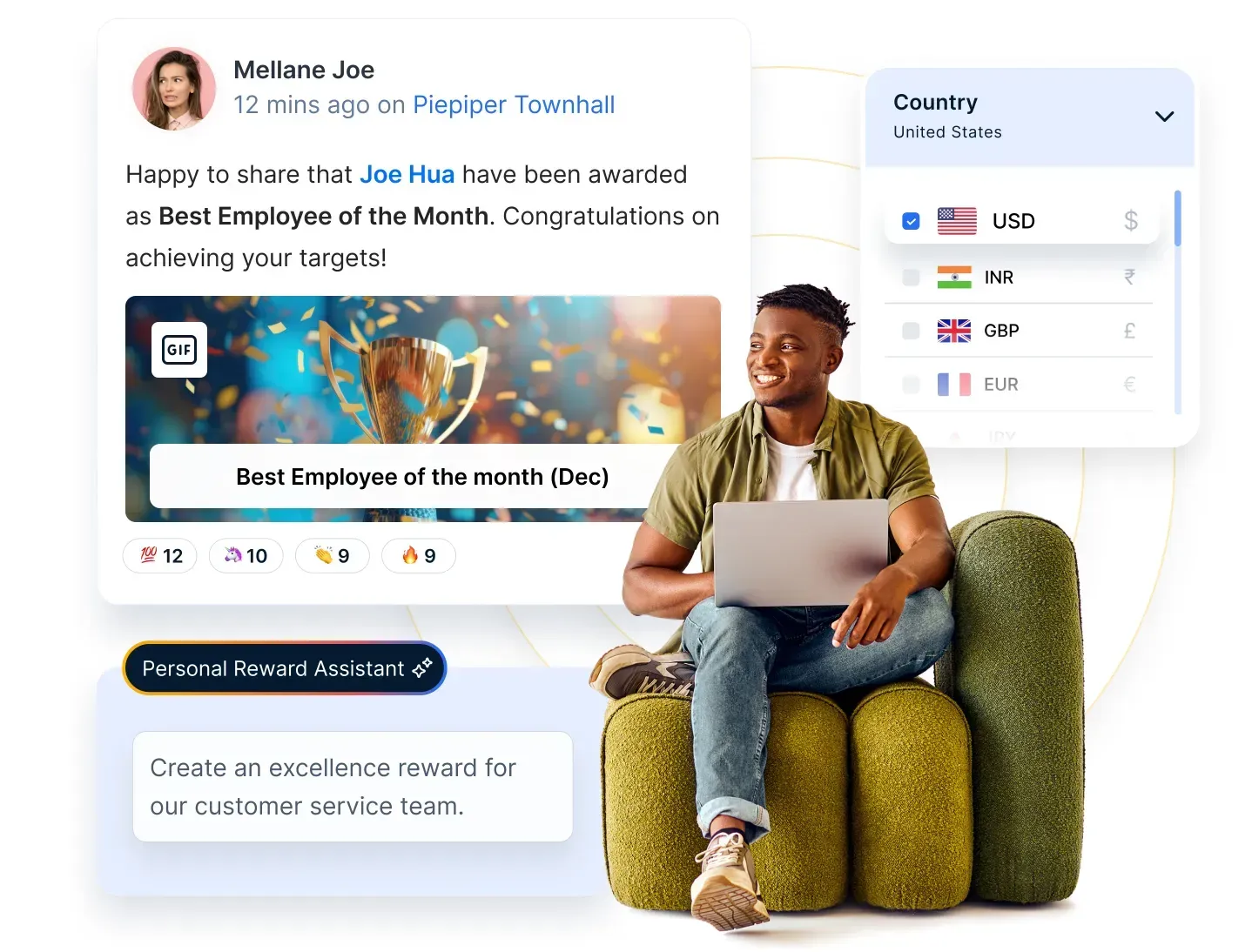
Empuls comes with a powerful rewards and recognition suite that helps companies:
- Offer instant digital recognition through peer-to-peer shoutouts, badges, leaderboards, and reward points.
- Gamify engagement to drive participation and excitement.
- Offer global rewards without currency or location barriers.
- Align recognition programs with organizational values.
Bonus: The digital rewards marketplace includes gift cards, experiences, branded swag, donations, and more for diverse preferences.
3. Empuls for generative ai-enhanced employee experience
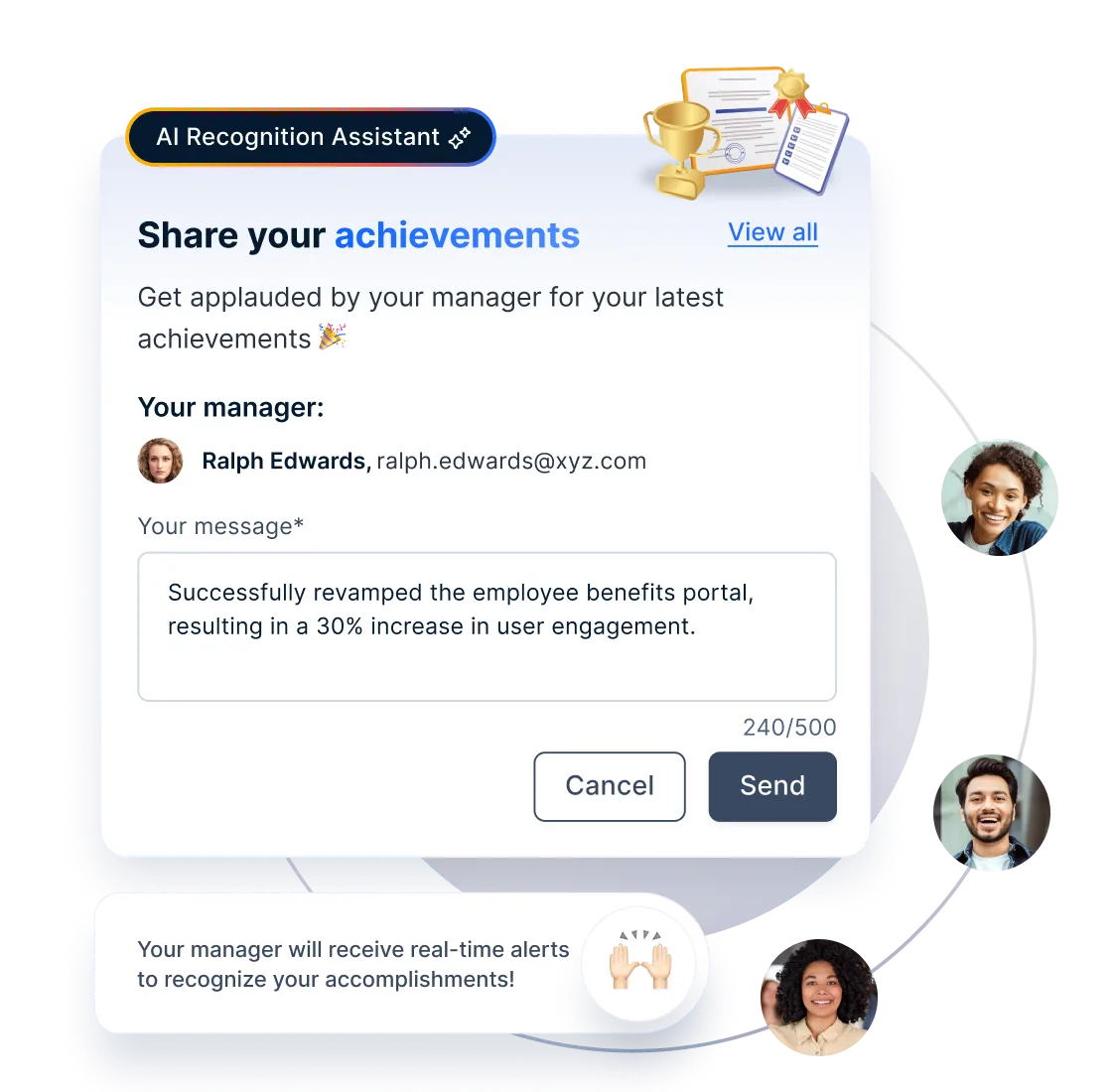
Empuls uses AI-based nudges and insights to:
- Recommend personalized surveys, rewards, and campaigns.
- Automate pulse checks and feedback loops.
- Predict engagement dips and recommend actions before they escalate.
- Craft tailored engagement journeys based on employee behavior patterns.
Bonus: AI helps managers deliver personalized appreciations and take proactive action on feedback trends.
4. Empuls for skills-based hiring and internal talent mobility support
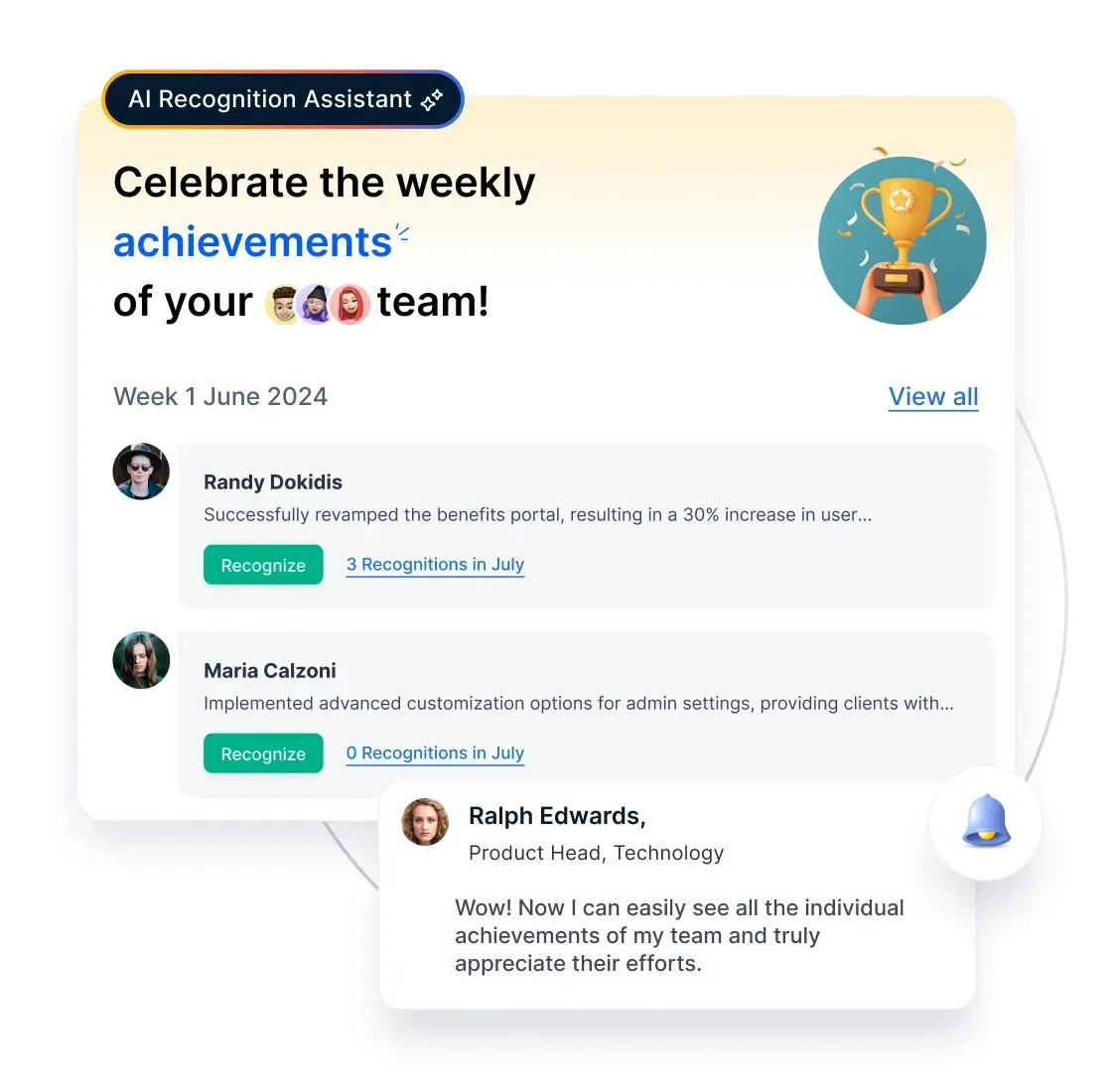
While Empuls itself isn’t a hiring tool, it complements talent strategies by:
- Creating a skills-driven recognition and rewards ecosystem.
- Highlighting top performers, contributors, and skill owners through social recognition walls.
- Supporting learning culture by incentivizing upskilling, certifications, and internal growth.
Bonus: Empuls can integrate with LMS systems to reward learning milestones.
5. Empuls for financial wellness programs
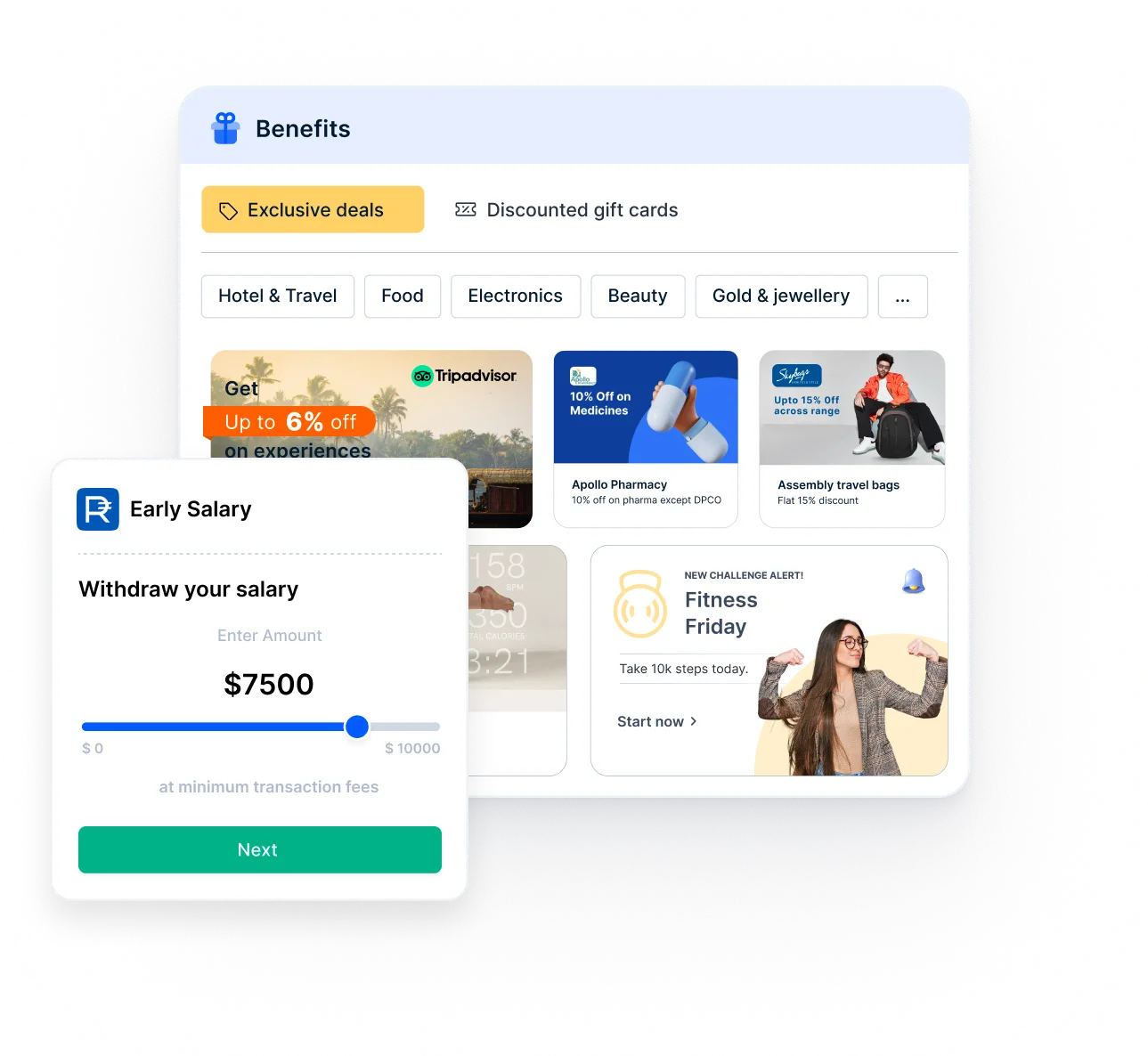
Empuls enhances the well-being ecosystem by:
- Allowing companies to embed financial wellness initiatives into engagement campaigns.
- Rewarding employees for participating in financial literacy programs, savings plans, and investment education.
- Offering wallet-style reward redemptions, helping employees utilize benefits smartly.
Bonus: Employees can choose rewards that contribute to their financial goals, like savings vouchers, fuel cards, or investment services.
6. Empuls for organizational culture and civility

Empuls strengthens culture by:
- Driving value-based recognitions that reward behaviors aligned with organizational values.
- Building a positive, inclusive culture through peer appreciation, social celebrations, and transparency.
- Supporting diversity, equity, and inclusion initiatives with custom campaigns and community-building activities.
Bonus: Celebration of work anniversaries, birthdays, achievements, and personal milestones humanizes the workplace.
7. Empuls for ai-powered strategic hr decision-making
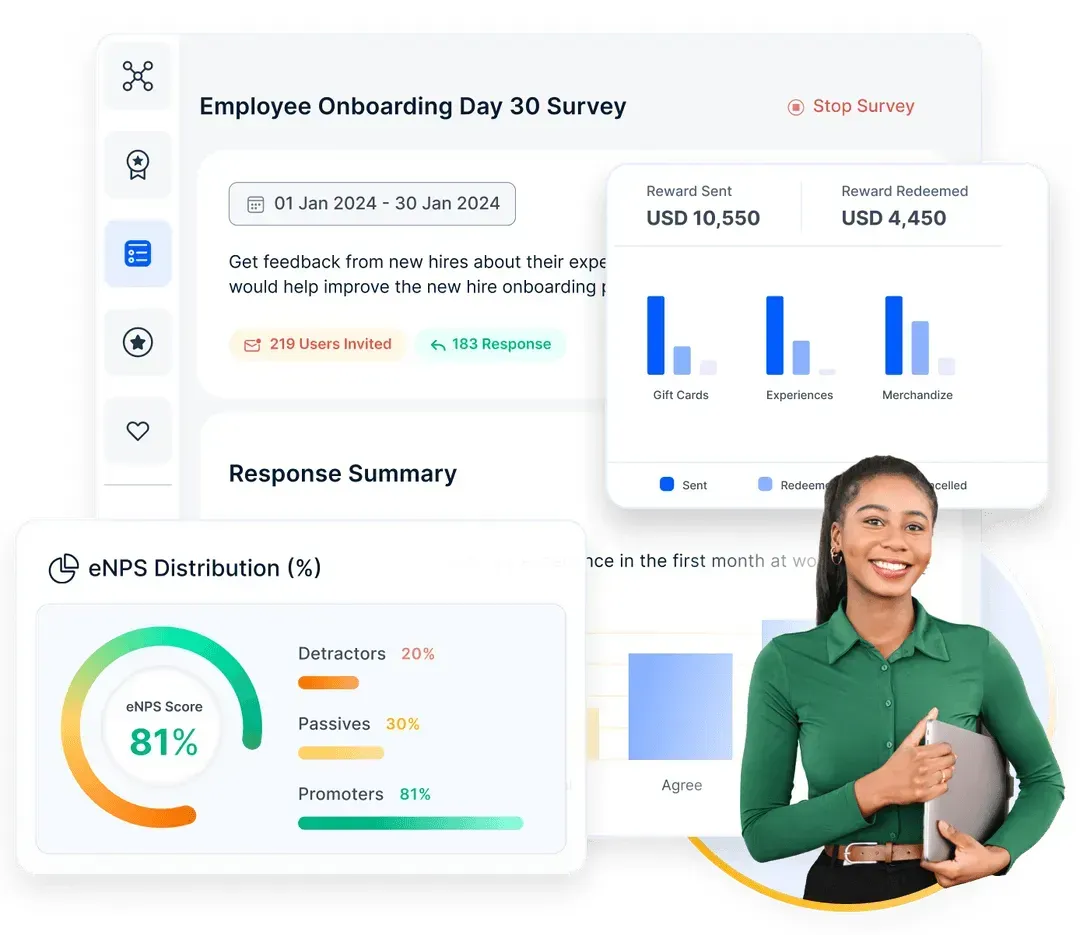
Empuls offers data-driven dashboards and analytics that help HRs:
- Track engagement, satisfaction, participation, and sentiment.
- Identify attrition risks and disengagement patterns.
- Make predictive decisions based on real-time workforce data.
Bonus: Empuls provides heat maps, sentiment analysis, and engagement trend reports to help HR leadership plan ahead.
Conclusion
As we continue navigating through 2025, human resource future trends emphasize agility, empathy, and innovation. From skills-first strategies to AI-powered HR tech, organizations must look beyond conventional models to craft work environments that are resilient, inclusive, and ready for the future.
These latest HR trends underscore the need for technology-integrated, people-first approaches that align business goals with human potential. The companies that embrace these changes today will define the workplace of tomorrow. Empuls empowers businesses to:
- Create meaningful employee experiences,
- Drive engagement with precision,
- Recognize talent continuously, and
- Build resilient, high-performing workplaces.
By partnering with Empuls, companies are not just keeping pace with HR trends—they're setting the pace for the future of work. So, schedule a call now!





